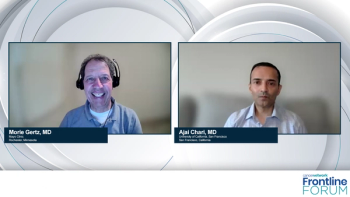Advancements in Multiple Myeloma Treatment: Frontline Approaches and Therapies for Early Relapse

Panelists discuss how VRd (bortezomib, lenalidomide, dexamethasone) remains the standard frontline regimen for transplant-eligible newly diagnosed multiple myeloma (NDMM) patients, though some now consider adding daratumumab (dara-VRd) in high-risk cases.

Panelists discuss how patient-specific factors like age, comorbidities, cytogenetic risk status, and personal preferences guide decisions to deviate from standard protocols, with particular attention to frailty scores and organ function when considering treatment intensity.

Panelists discuss how the decision between quadruplet versus triplet therapy depends on multiple factors, including cytogenetic risk status, insurance coverage/drug access, patient fitness to tolerate additional toxicity, and the strength of evidence supporting improved outcomes with 4-drug combinations.

Panelists discuss how recent clinical trials have demonstrated improved outcomes with antibody-containing regimens and biomarker-driven approaches in patients with transplant not-preferred newly diagnosed multiple myeloma (NDMM).

Panelists discuss how the CEPHEUS trial’s demonstration of improved progression-free survival with daratumumab-VRd versus VRd alone in transplant not-preferred NDMM provides compelling evidence for quadruplet therapy in this setting, though considerations of cost, toxicity management, and patient selection remain important factors in implementation.

Panelists discuss how chimeric antigen receptor (CAR) T-cell therapy in early relapsed multiple myeloma can provide deep and durable responses for eligible patients, though patient selection, timing of referral, manufacturing logistics, and management of adverse effects remain important considerations in optimizing outcomes.


